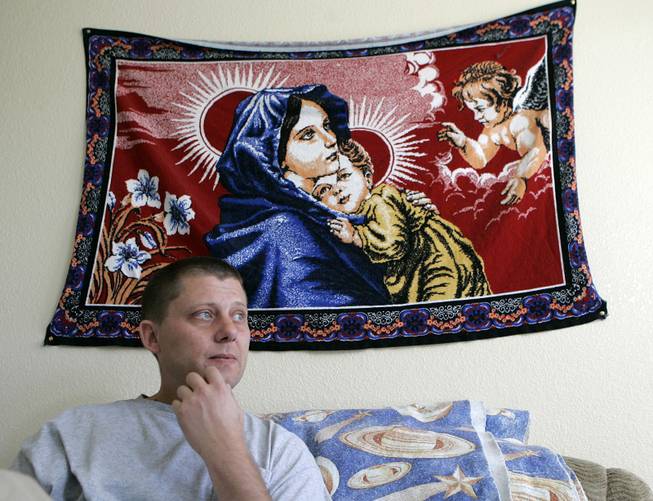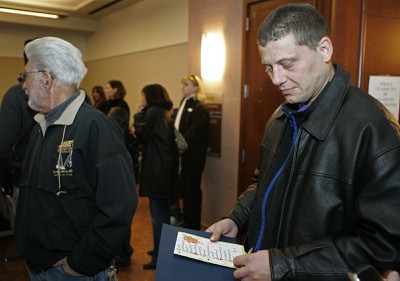
Jason Blackwood, now in his own apartment, spent years overwhelmed by mental illness and drugs. He cleaned up with intensive help from Clark County’s Mental Health Court. Senior Judge John McGroarty, who helped craft the program, says the goal is to keep participants out of jail, which often costs them their jobs and their homes.
Tuesday, Jan. 29, 2008 | 2 a.m.
Sun Archives
- LV homicide puts mental health system under a microscope (10-10-03)
- No longer under the radar (3-25-05)
- Report to Legislature shows rising mental illness (1-12-05)
- Mental health court to begin in December (9-17-03)
- Editorial: OK funds for mental health now (2-18-03)
- Editorial: Mental health woes (2-21-07)
Beyond the Sun
Jason Blackwood nervously knelt on the roof, portable phone in hand, and prepared to call the police. There were people dressed as animals below, the 14-year-old introvert told his mom, and they were poised to rob the surrounding homes.
The neighborhood was quiet and barren, his shaken mother informed him from inside.
Years later, Jeanine Blackwood began reinforcing her bedroom door at night with a chair to protect her from a son whose schizophrenic symptoms exploded when the drugs — cocaine, heroin and methamphetamine, among others — took hold. He tore up her home, once flooding it, and frequently beat her.
“Voices in my head said, ‘I’m going to kill you’ or ‘Take the butter out of the fridge,’ ” Jason Blackwood recalls with a slight laugh. “Just crazy voices.”
Note the verb tense of his story.
At 34, Blackwood is clean now, after almost three years of intense drug and medical intervention by state court officials. The program saved him from prison, but is only a first step: He may be healthy, but where does he go from here?
“He’s almost like their poster child,” his 65-year-old mother says.
• • •
Consider Blackwood’s record: By 2005, he had racked up 25 arrests, mostly in domestic disputes and petty thefts to support his habit. That prompted his mother to buy Mace and get a restraining order against him.
“In my heart, I knew he loved me, but I didn’t know how far over the edge he would go,” says Jeanine Blackwood, who is no stranger to her son’s disease. Her grandfather was schizophrenic.
After one of Jason Blackwood’s last arrests — and an attempted hospitalization — he arrived at her doorstep with a hammer in his hand.
Faced with again processing a clearly sick man through the Clark County Detention Center, law enforcement officials in 2005 offered him an alternative:
Enroll in the Mental Health Court’s program.
If he were to avoid jail, Blackwood would have to wean himself off the illicit drugs. He accepted.
• • •
That kind of opportunity for the mentally ill was long overdue. A Sun investigation in late 2004 found a lack of coordination among police, civil court and mental health officials that allowed him back on the streets without psychiatric care.
Launched in 2003, the Mental Health Court is one of the more progressive at the Regional Justice Center: It’s therapeutic, not punitive.
“We want to stop the revolving door” for the mentally ill, says Senior Judge John McGroarty, who helped craft the program. “Many are thrown in jail, lose their jobs and homes and become homeless.”
Mental Health Court is in the same courtroom that’s home to Las Vegas’ prominent cases, including O.J. Simpson’s. Yet on Thursdays, the two tables facing the bench — one for the plaintiff, the other for the defendant — are pushed together, enabling the program’s coordinators, psychiatrist, parole officer and representatives of the district attorney’s and public defender’s offices to sit as a team.
“Other departments have so much red tape,” says Stacy DePriest, the program’s coordinator.
McGroarty, she elaborates, helps this sometimes disenfranchised population to remove barriers: He’ll remove “nebulous charges,” such as indecent exposure for a homeless man urinating outdoors.
In court, McGroarty generally stands near the pews, engaging the participants in easy dialogue. The 76 participants, whose disabilities run the gamut of mental illnesses, tend to hesitate when they address McGroarty. But they seem to trust him.
Before completing the program, one participant violated his no-alcohol clause and then fled Southern Nevada in a packed trailer. He was caught in Reno.
“He assumed he’d be tossed in jail,” McGroarty says. “I told him we didn’t want another notch on our belt.”
• • •
With Blackwood, the odds of success were long. He entered the program isolated and practically incommunicative.
“He told me he realized he didn’t have anything to say,” says Diane Estes, a mental health supervisor based at the Salvation Army campus in North Las Vegas, where Blackwood now lives.
Blackwood couldn’t hold down a job. He had been a broiler cook at a family-style restaurant, but lost his job when he stole cooking oil.
Drunk and angry, Blackwood tossed a lighted match at Mandalay Bay and was arrested. Later, he put a rug in a microwave and pressed start.
The sickness had worsened, and drugs had ceased to serve as self-medication.
“He took a screw and put it right through this portrait I had of him — right through his eye,” his mother says.
• • •
Perhaps his increasing dislike of his life — and himself — boosted his chances at completing the Mental Health Court’s program.
“They must be amenable to treatment,” says DePriest, citing a 30-year heroin addict who has been clean for 10 months now.
Not everyone with a background like Blackwood’s is eligible for the program. Those who commit extremely violent crimes or sexual assaults are not admitted; other potential participants are vetted by the district attorney’s office.
Participants attend regular classes to improve decision-making and the management of their lives. They also get help stabilizing their medications — which Blackwood thinks was the most crucial element of his treatment.
“He’s much more insightful now in terms of his awareness of mental illness, as well as of his drug addiction,” says his psychiatrist, Craig Essex. “Without the program, it’s anybody’s guess where he was headed.”
The 34 graduates of the program appear to have been worth the county’s investment in them. The county spends about $13,000 annually on each participant, far less than the $36,000 it costs for each person imprisoned.
In the two years before the graduates entered the program, they collectively committed 93 misdemeanors and 31 felonies. In the first 10 1/2 months after completing the program, the graduates have been arrested nine times for misdemeanor offenses and twice for felonies.
“People think (the mentally ill) have more choice than they do,” DePriest says.
If Blackwood lapsed, DePriest would recommend he return to the program.
Graduation, Blackwood says, is just the beginning: “It makes me feel something secure is happening, getting off the streets, stabilizing my meds.”
• • •
But the beginning of what? Some graduates quickly join the rat race, but Blackwood, who has a 12-year-old son in Illinois, has no plans to. He doesn’t have a single goal — not even finding a girlfriend.
In between attending two classes most days, he sits under a tented patio at the Salvation Army campus with a cigarette, his headphones blasting Green Day or whatever is on contemporary rock radio. This is how he spends most of his days.
If this is the peak of his life, Blackwood’s OK with that. He’s still insecure, but finally safe.
“Maybe from the turmoil he was going through before ... makes this (stage) total happiness for him, because you never knew what to expect before,” Jeanine Blackwood says.
Jason Blackwood’s next step will be enrolling in vocational rehabilitation, Estes says.
“I think he’ll be ready to move on before next year,” she says.
Blackwood has an apartment now, a modest efficiency at the Salvation Army that’s his own. It’s sparse but comfy; he has symbols of the Virgin Mary, pictures of hotels and a mime-like mask that is a whimsical nod to those voices that alternately terrified and amused him.
“He’s not the same child anymore,” his mother says. “He’ll never be normal. I don’t think he has the maturity of a 34-year-old.”
But don’t mistake Jeanine Blackwood’s observation as a complaint. About four months ago, her son began apologizing for hurting her, physically and emotionally.
“I’m one of the lucky moms,” she says. “I wish there were hundreds of me out there, but there aren’t.
“Inside that monster, I knew there was a good kid.”


Join the Discussion:
Check this out for a full explanation of our conversion to the LiveFyre commenting system and instructions on how to sign up for an account.
Full comments policy